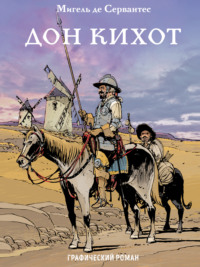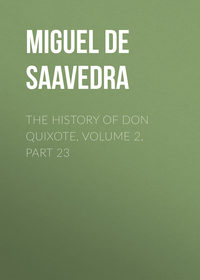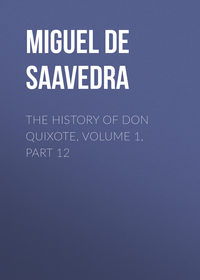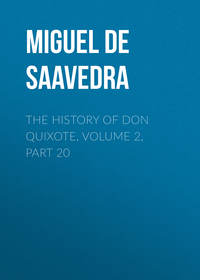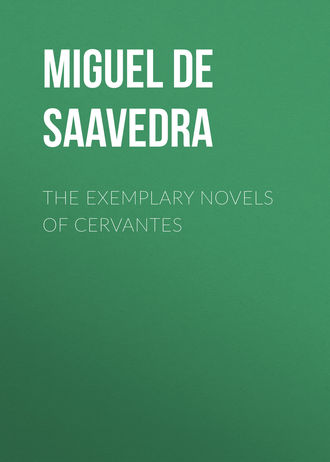 полная версия
полная версияThe Exemplary Novels of Cervantes
The youth had listened with great attention to all Teodoro said, and, before answering her a word, he seized her hands, carried them by force to his lips, kissed them with great fervour, and even bedewed them copiously with tears. Teodoro could not help sympathising with the acute feelings of the youth, and shedding tears also. Although, when she had with difficulty withdrawn her hands from the youth's lips, he replied with a deep-drawn sigh, "I will not, and cannot deny, señora, that your suspicion is true; I am a woman, and the most unfortunate of my sex; and since the acts of kindness you have conferred upon me, and the offers you make me, oblige me to obey all your commands, listen and I will tell you who I am, if indeed it will not weary you to hear the tale of another's misfortunes."
"May I never know aught else myself," replied Teodoro, "if I shall not feel a pleasure in hearing of those misfortunes equal to the pain it will give me to know that they are yours, and that will be such as if they were my own." And again she embraced and encouraged the seeming youth, who, somewhat more tranquilised, continued thus: —
"I have spoken the truth with regard to my native place, but not with regard to my parents; for Don Enrique is not my father but my uncle, and his brother Don Sancho is my father. I am that unhappy daughter of his of whom your brother says that she is celebrated for her beauty, but how mistakenly you now perceive. My name is Leocadia; the occasion of my disguise you shall now hear.
"Two leagues from my native town there is another, one of the wealthiest and noblest of Andalusia, where lives a cavalier of quality, who derives his origin from the noble and ancient Adornos of Genoa. He has a son, who, unless fame exaggerates his praises as it does mine, is one of the most gallant gentlemen one would desire to see. Being so near a neighbour of ours, and being like my father strongly addicted to the chase, he often came on a visit of five or six days to our house, the greater part of that time, much of the night even included, being spent by my father and him in the field. From these visits of his, fortune, or love, or my own imprudence, took occasion to bring me down to my present state of degradation. Having observed, with more attention than became a modest and well-behaved maiden, the graceful person and manners of our visitor, and taking into consideration his distinguished lineage and the great wealth of his parents, I thought that to obtain him for my husband would be the highest felicity to which my wishes could aspire. With this thought in my head I began to gaze at him most intently, and also, no doubt, with too little caution, for he perceived it, and the traitor needed no other hint to discover the secret of my bosom and rob me of my peace. But why should I weary you by recapitulating every minute detail of my unfortunate attachment? Let me say at once that he won so far upon me by his ceaseless solicitations, having plighted his faith under the most solemn and, as I thought, the most Christian vows that he would become my husband, that I put myself wholly at his disposal. Nevertheless, not being quite satisfied with his vows alone, and in order that the wind might not bear them away, I made him commit them to writing, and give them to me in a paper signed with his own hand, and drawn up in terms so strong and unequivocal as to remove all my mistrust. Once in possession of this paper, I arranged that he should come to me one night, climb the garden-wall, and enter my chamber, where he might securely pluck the fruit destined for him alone. The night so longed for by me at last arrived – "
Up to this point Teodoro had listened with rapt attention, especially since she had heard the name of Adorno, but now she could contain herself no longer. "Well," she cried, suddenly interrupting the speaker, "and then, what did he do? Did he keep the assignation? Were you happy in his arms? Did he confirm his written pledge anew? Was he content when he had obtained from you what you say was his? Did your father know it? What was the end of this good and wise beginning?"
"The end was to bring me to what you see, for he never came."
Teodoro breathed again at these words, and partly recovered her self-possession, which had been almost destroyed by the frantic influence of jealousy. Even yet she was not so free from it but that she trembled inwardly as Leocadia continued her story.
"Not only did he fail to keep the assignation, but a week after I learned for certain that he had disappeared from home, and carried off from the house of her parents, persons of distinction in his own neighbourhood, a very beautiful and accomplished young lady named Teodosia. I was nearly mad with jealousy and mortification. I pictured Teodosia to myself in imagination, more beautiful than the sun, more perfect than perfection itself, and above all, more blissful than I was miserable. I read the written engagement over and over again; it was as binding as any form of words could be; but though my hopes would fain have clung to it as something sacred and inviolable, they all fell to the ground when I remembered in what company Marco Antonio had departed. I beat my face, tore my hair, and cursed my fate; but what was most irksome to me was that I could not practise these self-inflictions at all hours in consequence of my father's presence. In fine, that I might be free to indulge my woe without impediment, I resolved to quit my home. It would seem that the execution of a bad purpose never fails for want of opportunity. I boldly purloined a suit of clothes belonging to one of my father's pages, and from himself a considerable sum of money; then leaving the house by night I travelled some leagues on foot, and reached a town called Osuna, where I hired a car. Two days afterwards I entered Seville, where I was quite safe from all pursuit.
"There I bought other clothes, and a mule, and set out with some cavaliers who were travelling with all speed to Barcelona, that they might be in time for some galleys that were on their way to Italy. I continued my journey until yesterday, when the robbers took everything from me, and among the rest, that precious thing which sustained my soul and lightened my toils, the written engagement given me by Marco Antonio. I had intended to carry it with me to Italy, find Marco Antonio there, and present it to him as an evidence of his faithlessness and my constancy, and constrain him to fulfil his promise. At the same time I am conscious that he may readily deny the words written on this paper, since he has made nought of the obligations that should have been engraved on his soul; besides, it is plain that if he is accompanied by the incomparable Teodosia he will not deign to look upon the unfortunate Leocadia. But happen what may, I am resolved to die or present myself before the pair, that the sight of me may trouble their joy. This Teodosia, this enemy of my peace, shall not so cheaply enjoy what is mine. I will seek her out, I will find her, and will take her life if I can."
"But how is Teodosia in fault," said Teodoro, "if, as is very probably the case, she too has been deluded by Marco Antonio, as you, señora, have been?"
"How can that be so," returned Leocadia, "if he has her with him? Being with the man she loves, what question can there be of delusion? They are together, and therefore they are happy, and would be so, though they were in the burning deserts of Lybia, or the dreary wastes of Scythia. She is blest in his arms wherever she is, and therefore she shall pay for all I shall suffer till I find her."
"It is very likely you are mistaken," said Teodoro; "I am very well acquainted with this enemy of yours, as you call her, and I know her prudence and modesty to be such, that she never would venture to quit her father's house and go away with Marco Antonio. And even had she done so, not knowing you, nor being aware of any claim you had on him, she has not wronged you at all, and where there is no wrong, vengeance is out of place."
"Tell me not of her modesty, señor; for I was as modest and as virtuous as any maiden in the world, and yet I have done what I have told you. That he has carried her off there is no doubt. I acknowledge, looking on the matter dispassionately, that she has not wronged me; but the pangs of jealousy which she occasions me make me abhor her. If a sword were thrust through my vitals, should I not naturally strive to pluck it out and break it to pieces?"
"Well, well, señora Leocadia, since the passion that sways you makes you speak so wildly, I see it is not the fit time to offer you rational advice. I shall therefore content myself with repeating that I am ready and willing to render you every service in my power, and I know my brother's generous nature so well, that I can boldly make you the same promise on his part. We are going to Italy, and it rests only with yourself to accompany us. One thing only I entreat, that you will allow me to tell my brother what I know of your story, that he may treat you with the attention and respect which is your due. I think you had better continue to wear male attire, and if it is to be procured in this place, I will take care that you shall be suitably equipped to morrow. For the rest, trust to time, for it is a great provider of remedies even for the most desperate cases."
Leocadia gratefully thanked the generous Teodoro, saying he might tell his brother whatever he thought fit, and beseeching him not to forsake her, since he saw to what dangers she was exposed, if she was known to be a woman. Here the conversation ended, and they retired to rest, Teodosia in her brother's room, and Leocadia in another next it. Don Rafael was still awake, waiting for his sister to know what had passed between her and the suspected woman; and before she lay down, he made her relate the whole to him in detail. "Well, sister," he said when she had finished, "if she is the person she declares herself to be, she belongs to the best family in her native place, and is one of the noblest ladies of Andalusia. Her father is well known to ours, and the fame of her beauty perfectly corresponds with the evidence of our own eyes. My opinion is, that we must proceed with caution, lest she come to speak with Marco Antonio before us, for I feel some uneasiness about that written engagement she speaks of, even though she has lost it. But be of good cheer, sister, and go to rest, for all will come right at last."
Teodosia complied with her brother's advice so far as to go to bed, but it was impossible for her to rest, so racked was she by jealous fears. Oh, how she exaggerated the beauty of Leocadia, and the disloyalty of Marco Antonio! How often she read with the eyes of her imagination his written promise to her rival! What words and phrases she added to it, to make it more sure and binding! How often she refused to believe that it was lost! And how many a time she repeated to herself, that even though it were lost, Marco Antonio would not the less fulfil his promise to Leocadia, without thinking of that by which he was bound to herself! In such thoughts as these she passed the night without a wink of sleep; nor was her brother Don Rafael less wakeful; for no sooner had he heard who Leocadia was, than his heart was on fire for her. He beheld her in imagination, not tied to a tree, or in tattered male garments, but in her own rich apparel in her wealthy father's house. He would not suffer his mind to dwell on that which was the primary cause of his having become acquainted with her; and he longed for day that he might continue his journey and find out Marco Antonio, not so much that he might make him his brother-in-law, as that he might hinder him from becoming the husband of Leocadia. In fact, he was so possessed by love and jealousy, that he could have borne to see his sister comfortless, and Marco Antonio fairly buried, rather than be himself without hope of obtaining Leocadia.
Thus with different thoughts, they all quitted their beds at break of day, and Don Rafael sent for the host, and asked him if he could purchase a suit of clothes in that place for a page who had been stripped by robbers. The host said he happened to have one for sale which he would dispose of at a reasonable price. He produced it, Leocadia found that it fitted her very well, she put it on, and girt herself with sword and dagger with such sprightly grace that she enchanted Don Rafael, and redoubled Teodosia's jealousy. Calvete saddled the mules, and about eight in the morning, they started for Barcelona, not intending to take the famous monastery of Monserrate on their way, but to visit it on a future occasion, whenever it might please God to send them home again with hearts more at ease.
Words are not adequate to describe the feelings of the two brothers, or with what different eyes they severally regarded Leocadia; Teodosia wishing for her death, and Don Rafael for her life; Teodosia striving to find faults in her, in order that she might not despair of her own hopes; and Don Rafael finding out new perfections, that more and more obliged him to love her. All these thoughts, however, did not hinder their speed, for they reached Barcelona before sunset. They admired the magnificent situation of the city, and esteemed it to be the flower of the world, the honour of Spain, the terror of all enemies near and far, the delight of its inhabitants, the refuge of strangers, the school of chivalry, the model of loyalty, in a word, a union of all that a judicious curiosity could desire in a grand, famous, wealthy, and well-built city. Upon their entering it they heard a great uproar, and saw a multitude of people running with loud cries. They inquired the cause, and were told that the people of the galleys in the port had fallen upon those of the town. Don Rafael desired to see what was going on, though Calvete would have dissuaded him; for, as the muleteer said, he knew well what mischief came of interfering in such frays as this, which usually occurred in Barcelona when galleys put in there.
In spite of this good advice, Don Rafael and his fellow-travellers went down at once towards the beach, where they saw many swords drawn, and numbers of people slashing at each other without mercy, and they approached so near the scene without dismounting, that they could distinctly see the faces of the combatants, for the sun was still above the horizon. The number of townspeople engaged was immense, and great crowds issued from the galleys, although their commander, Don Pedro Vique, a gentleman of Valencia, stood on the prow of the flag-ship, threatening all who entered the boats to succour their comrades. Finding his commands disregarded, he ordered a gun to be fired without ball, as a warning that if the combatants did not separate, the next gun he fired would be shotted. Meanwhile, Don Rafael, who narrowly watched the fray, observed among those who took part with the seamen a young man of about two-and-twenty, dressed in green, with a hat of the same colour, adorned with a rich loop and buttons apparently of diamonds. The skill and courage with which he fought, and the elegance of his dress, drew upon him the attention of all the spectators, and Teodosia and Leocadia both cried out, as if with one voice, "Good heavens! either my eyes deceive me, or he in green is Marco Antonio." Then, with great nimbleness, they dismounted, drew their swords and daggers, cleared their way through the crowd, and placed themselves one on each side of Marco Antonio. "Fear nothing, Señor Marco Antonio," cried Leocadia, "for there is one by your side who will defend your life at the cost of his own." "Who doubts it," ejaculated Teodosia, on the other side, "since I am here?" Don Rafael, who had seen and heard all this, followed his two companions, and took sides as they did.
Marco Antonio was too busy smiting and defending himself to heed what his two seconds had said; he could think of nothing but fighting, and no man ever fought more bravely; but as the party of the town was every moment increasing in numbers, the people of the galleys were forced to retreat and take to the water. Marco Antonio retreated with the rest, much against his will, still attended on either side by his two valiant Amazons. By this time a Catalonian knight of the renowned House of Cardonas, made his appearance on a noble charger, and, throwing himself between the two parties, ordered the townspeople to retire. The majority obeyed, but some still continued to fling stones, one of which unluckily struck Marco Antonio on the breast with such force that he fell senseless into the water, in which he was wading up to his knees. Leocadia instantly raised and supported him in her arms, and Teodosia aided her.
Don Rafael, who had turned aside a little to avoid a shower of stones, saw the accident which had befallen Marco Antonio, and was hastening forward to his aid, when the Catalonian knight stopped him, saying, "Stay, señor, and do me the favour to put yourself by my side. I will secure you from the insolence of this unruly rabble."
"Ah, señor!" replied Rafael, "let me pass, for I see that in great danger which I most love in this world."
The knight let him pass, but before he could reach the spot, the crew of the flagship's boat had already taken on board Marco Antonio and Leocadia, who never let him out of her arms. As for Teodosia, whether it was that she was weary, or overcome with grief to see her lover wounded, or enraged with jealousy to see her rival with him, she had not strength to get into the boat, and would certainly have fallen in a fainting fit into the water, if her brother had not opportunely come to her aid, while he himself felt no less torment than his sister at seeing Leocadia go away with Marco Antonio.
The Catalonian knight being very much taken with the goodly presence of Don Rafael and his sister (whom he supposed to be a man), called them from the shore, and requested them to go with him, and they were constrained to accept his friendly offer, lest they should suffer some injury from the people, who were not yet pacified. Thereupon, the knight dismounted, and with his drawn sword in his hand, led them through the tumultuous throng, who made way at his command. Don Rafael looked round to see if he could discover Calvete with the mules; but he was not to be seen, for the moment his employers dismounted, he had gone off to an inn where he had lodged on previous occasions. On their arrival at the knight's abode, which was one of the principal houses in the city, he asked them in which of the galleys they had arrived. Don Rafael replied that they had not come in any, for they had arrived in the city just as the fray began; and it was because they had recognised the gentleman who was wounded with a stone that they had involved themselves in danger. Moreover, he entreated the knight would have the gentleman brought on shore, as he was one on whom his own dearest interests depended. "I will do so with great pleasure," replied the knight, "and I am sure the general will allow it, for he is a worthy gentleman and a relation of mine." Thereupon he went at once to the galley, where he found Marco Antonio under the hands of the surgeon, who pronounced his wound dangerous, being near the heart. With the general's consent he had him brought on shore with great care, accompanied by Leocadia, and carried to his own house in a litter, where he entertained the whole party with great hospitality.
A famous surgeon of the city was now sent for, but he would not touch the patient's wound until the following day, alleging that it had no doubt been properly treated already, army and navy surgeons being always men of skill, in consequence of their continual experience in cases of wounds. He only desired that the patient should be placed in a quiet room and left to rest. Presently the surgeon of the galley arrived, and had a conference with his colleague, who approved of what he had done, and agreed with him in thinking the case highly dangerous. Leocadia and Teodosia heard this with as much anguish of heart as if it had been a sentence of death upon themselves; but not wishing to betray their grief, they strove to conceal it in silence. Leocadia, however, determined to do what she thought requisite for her honour, and as soon as the surgeons were gone, she entered Marco Antonio's room, where, going up to his bed side, and taking his hand in presence of the master of the house, Don Rafael, Teodosia, and others, "Señor Marco Antonio Adorno," she said, "it is now no seasonable time, considering your condition, to utter many words; and therefore I shall only entreat you to lend your ear to some few which concern, if not the safety of your body, at least that of your soul. But I must have your permission to speak; for it would ill become me, who have striven never to disoblige you from the first moment I knew you, to disturb you now in what seems almost your last."
At these words Marco Antonio opened his eyes, looked steadfastly at Leocadia, and recognising her rather by the tone of her voice than by her face, said with a feeble voice, like one in pain, "Say on, señor, what you please, for I am not so far gone but that I can listen to you; nor is that voice of yours so harsh and unpleasing that I should dislike to hear it."
Teodosia hearkened most attentively, and every word that Leocadia spoke pierced her heart like an arrow, and at the same time harrowed the soul of Don Rafael. "If the blow you have received," continued Leocadia, "or rather that which has struck my heart, has not effaced from your memory, señor Marco Antonio, the image of her whom not long ago you called your glory and your heaven, you must surely call to mind who Leocadia was, and what was the promise you gave her in writing under your own hand; nor can you have forgotten the worth of her parents, her own modesty and virtue, and the obligation you are under to her for having always gratified you in everything you desired. If you have not forgotten all this, you may readily know, in spite of this disguise, that I am Leocadia. As soon as I heard of your departure from home, dreading lest new chances and opportunities should deprive me of what is so justly mine, I resolved, in defiance of the worst miseries, to follow you in this garb, and to search the wide world over till I found you. Nor need you wonder at this, if you have ever felt what the strength of true love is capable of, or know the frenzy of a deceived woman. I have suffered some hardships in my quest, all of which I regard as pastime since they have resulted in my seeing you; for, though you are in this condition, if it be God's will to remove you to a better world, I shall esteem myself more than happy if before your departure you do what becomes you, in which case I promise you to live in such a manner after your death that I shall soon follow you on that last inevitable journey. I beseech you then, for the love of heaven, for your own honour, and for my sake, to whom you owe more than to all the world, receive me at once as your lawful wife, not leaving it to the law to do what you have so many righteous motives for doing of your own accord."
Here Leocadia ceased speaking. All present had listened to her in profound silence, and in the same way they awaited the reply of Marco Antonio. "I cannot deny, señora," he said, "that I know you; your voice and your face will not suffer me to do that. Nor yet can I deny how much I owe to you, nor the great worth of your parents and your own incomparable modesty and virtue. I do not, and never shall, think lightly of you for what you have done in coming to seek me in such a disguise; on the contrary, I shall always esteem you for it in the highest degree. But since, as you say, I am so near my end, I desire to make known to you a truth, the knowledge of which, if it be unpleasant to you now, may hereafter be useful to you.
"I confess, fair Leocadia, that I loved you, and you loved me; and yet I confess also that my written promise was given more in compliance with your desire than my own; for before I had long signed it my heart was captivated by a lady named Teodosia, whom you know, and whose parentage is as noble as your own. If I gave you a promise signed with my hand, to her I gave that hand itself in so unequivocal a manner that it is impossible for me to bestow it on any other person in the world. My amour with you was but a pastime from which I culled only some flowers, leaving you nothing the worse; from her I obtained the consummate fruit of love upon my plighted faith to be her husband. That I afterwards deserted you both was the inconsiderate act of a young man who thought that all such things were of little importance, and might be done without scruple. My intention was to go to Italy, and after spending some of the years of my youth there, to return and see what had become of you and my real wife; but Heaven in its mercy, as I truly believe, has permitted me to be brought to the state in which you see me, in order that in thus confessing my great faults, I may fulfil my last duty in this world, by leaving you disabused and free, and ratifying on my deathbed the pledge I gave to Teodosia. If there is anything, señora Leocadia, in which I can serve you during the short time that remains to me, let me know it; so it be not to receive you as my wife, for that I cannot, there is nothing else which I will not do, if it be in my power, to please you."


